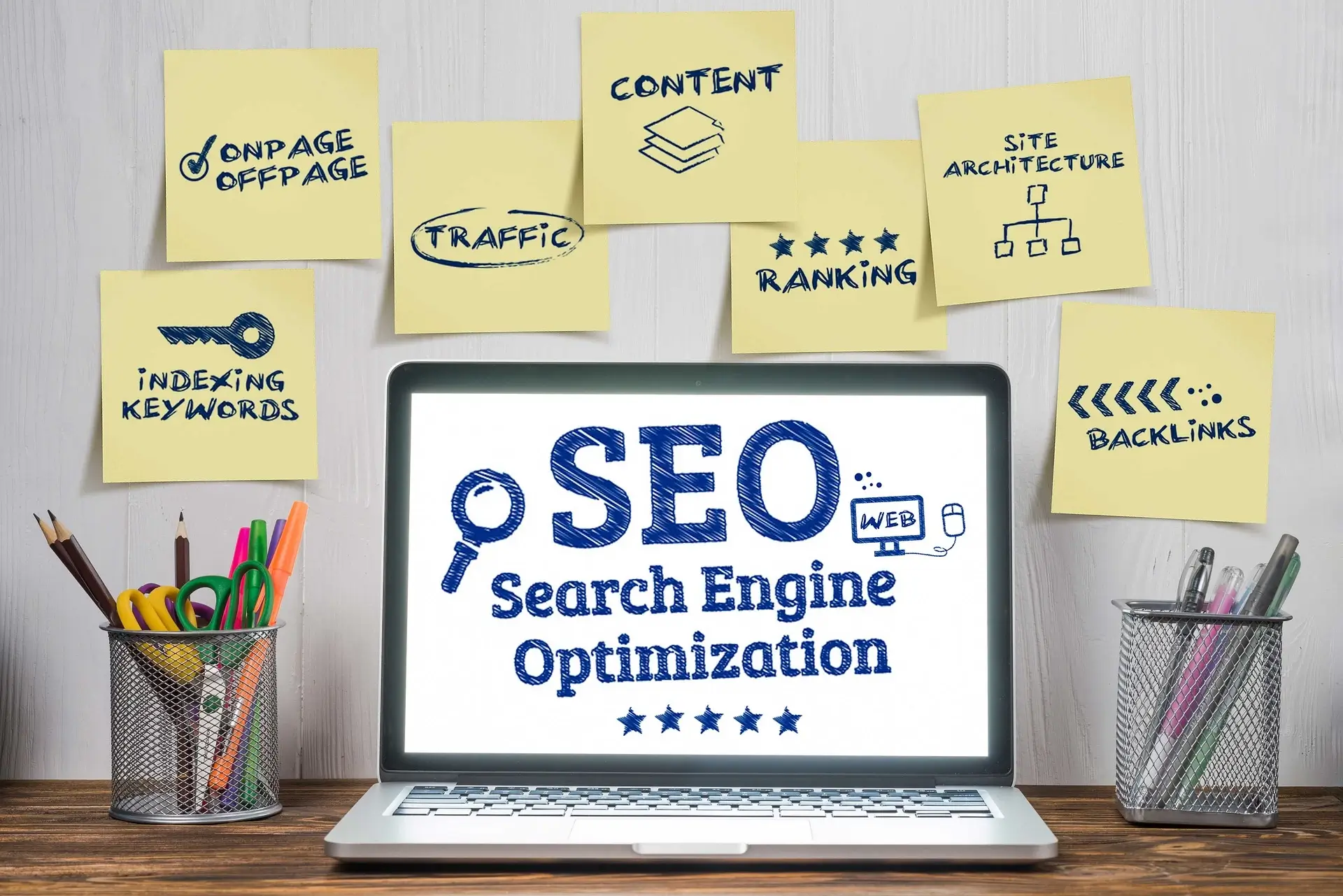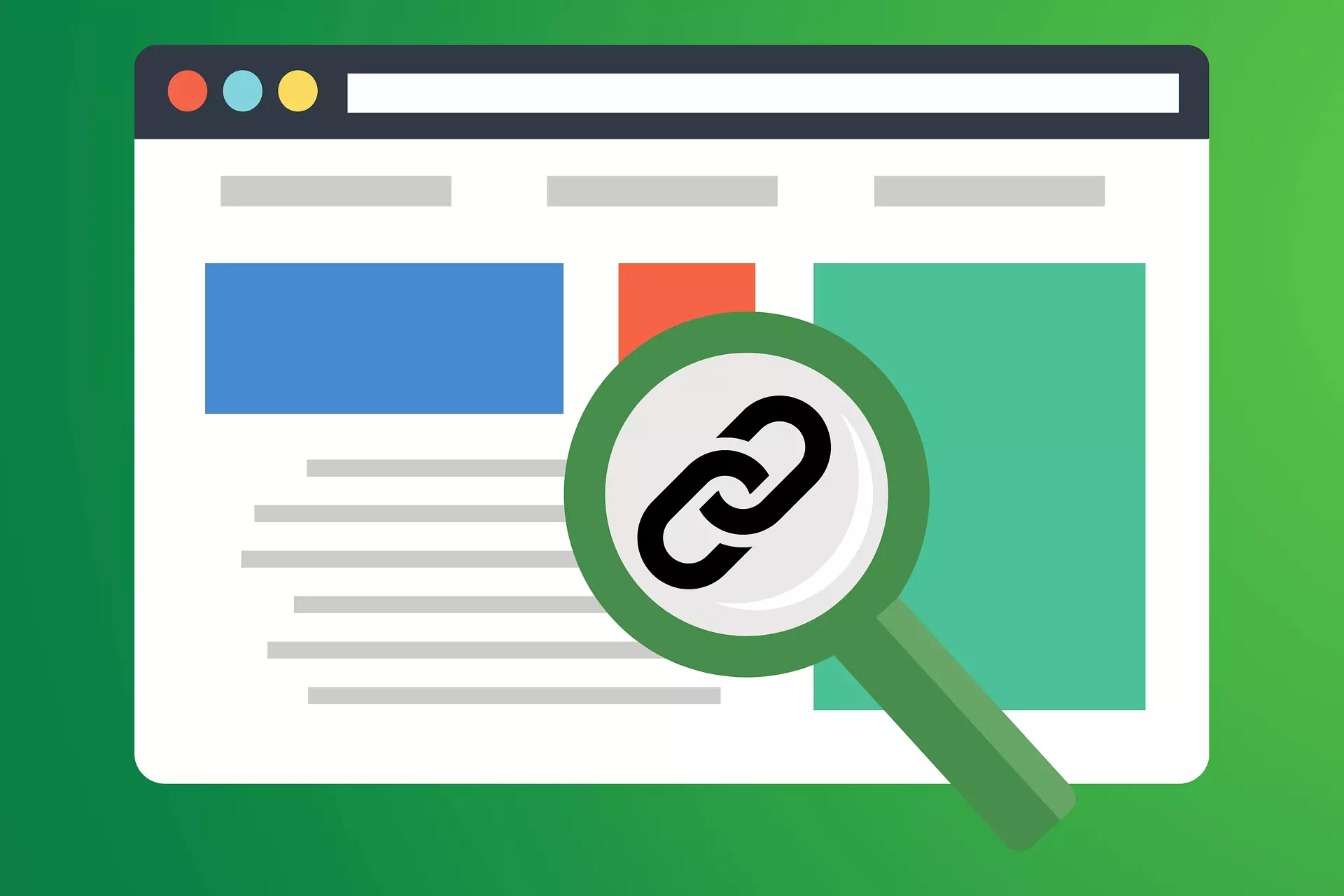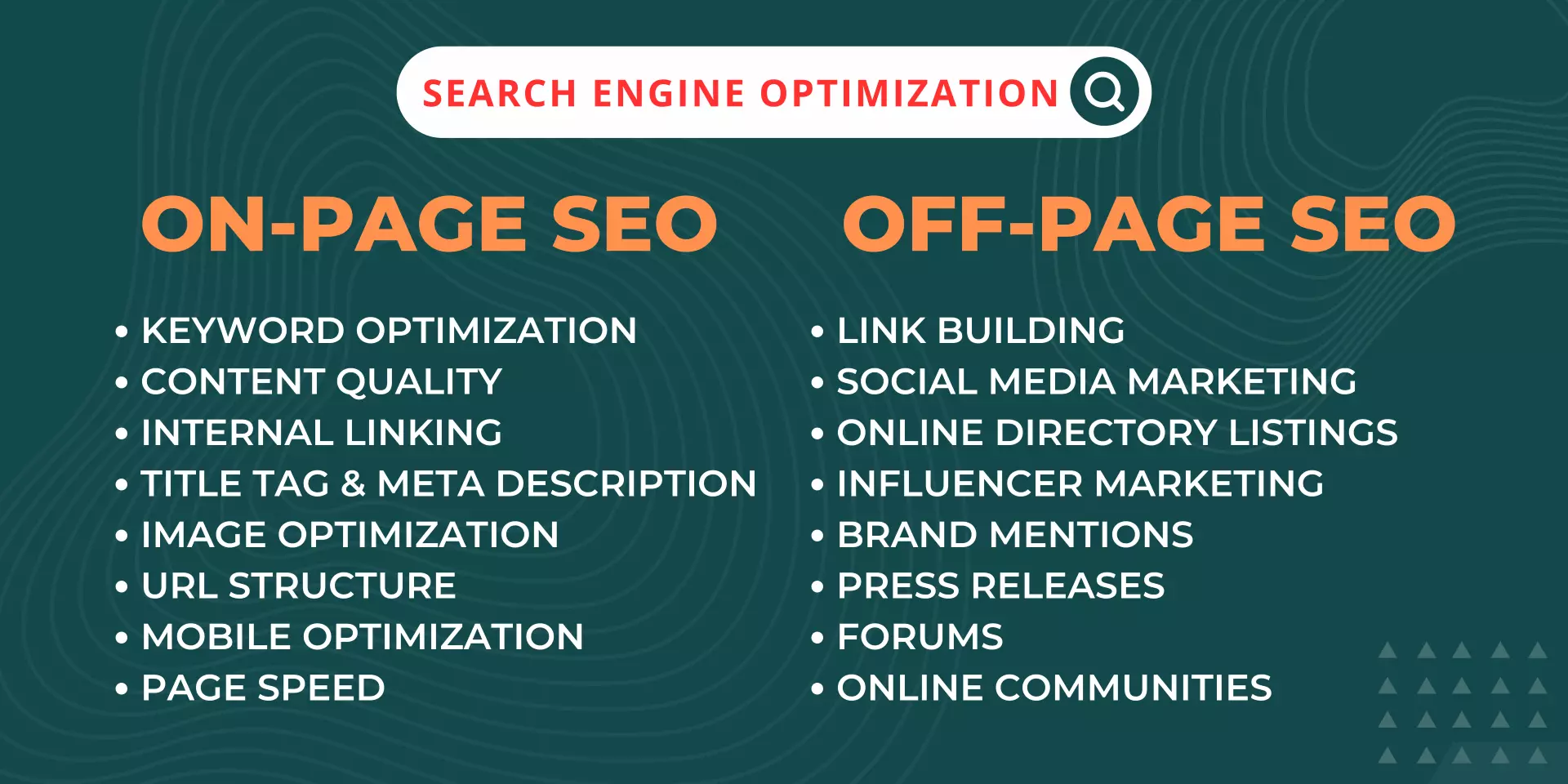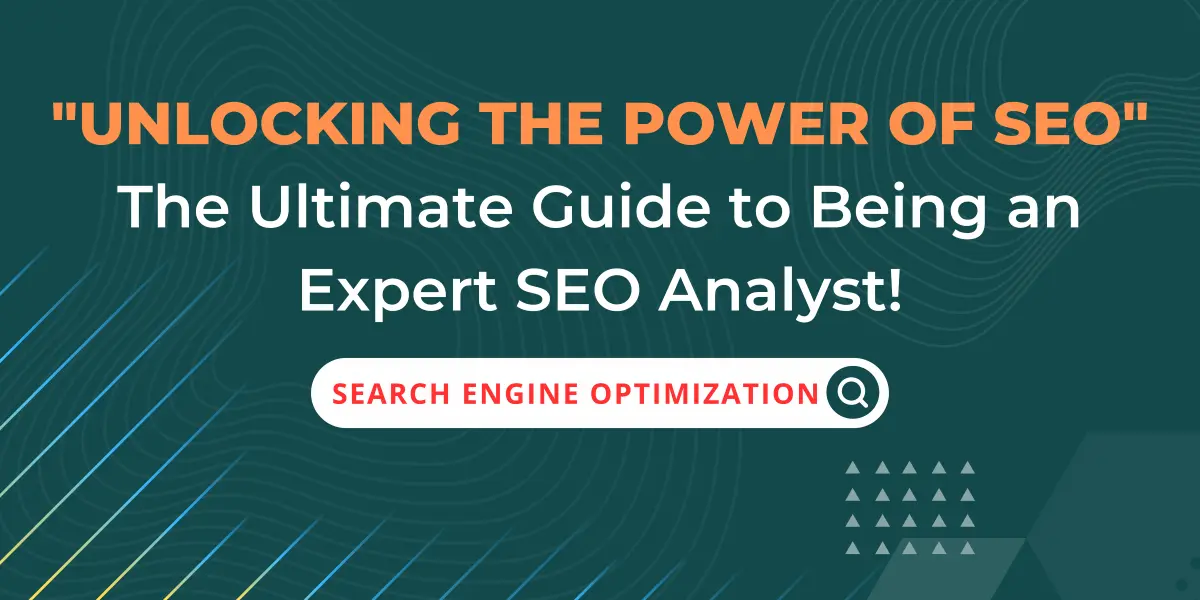What is SEO and how does it work?
SEO is an essential component of Digital Marketing. SEO stands for Search Engine Optimization, which is the practice of improving the quality and quantity of traffic to a website from search engines through organic search results. The ultimate goal of SEO is to increase the visibility and ranking of a website in search engine results pages (SERPs) for relevant and valuable search terms.
Search engines like Google, Bing, and Yahoo use complex algorithms to determine the relevance and authority of websites and to decide which websites should appear at the top of search results for specific keywords or phrases. These algorithms take into account a variety of factors such as website content, structure, backlinks, user behavior, and more.
To improve the ranking of a website in search results, SEO Analysts or Experts use a variety of techniques and strategies, both on-page and off-page, to optimize their website for search engines. These may include keyword research, content optimization, link building, technical SEO, mobile optimization, and more.
Ultimately, the goal of SEO is to create a website that provides value to users and meets the criteria of search engine algorithms, resulting in higher rankings and increased visibility in search engine results pages (SERPs).

What are the most important factors for ranking in search engine results?
Search engines use complex algorithms to determine the ranking of websites in search results, and the specific factors that are considered may vary over time and between different search engines. However, some of the most important factors that are generally considered to influence search engine rankings include:
Content Quality: High-quality, relevant, and valuable content that satisfies user search intent is crucial for ranking well in search results.
Backlinks: The quality and quantity of external links pointing to a website are important signals of its authority and relevance.
On-Page Optimization: Optimizing on-page elements such as title tags, meta descriptions, header tags, and internal links can help search engines understand the content and relevance of a website.
User Experience: Factors such as website speed, mobile optimization, and user engagement metrics like bounce rate, time on site, and click-through rate can influence search engine rankings.
Technical SEO: Technical factors such as website architecture, crawlability, site structure, and schema markup can impact how search engines understand and index a website.
Domain Authority: The authority and reputation of a website and its domain, as measured by factors such as age, history, and trustworthiness, can also play a role in search engine rankings.
It's important to note that these factors are not exhaustive, and search engine algorithms may also consider other factors depending on the specific search query and user intent.

How do search engines determine the relevance and authority of a website?
Search engines determine the relevance and authority of a website by using complex algorithms that take into account a wide range of factors. These algorithms are designed to provide the most relevant and useful results for a given search query based on a variety of signals. Here are some of the key factors that search engines use to determine relevance and authority:
Content: The content on a website is one of the most important factors that search engines use to determine relevance. Search engines analyze the text, images, and other content on a website to understand what the website is about and whether it is relevant to a particular search query.
Backlinks: Backlinks are links from other websites that point to a website. Search engines use backlinks to assess the authority of a website. Websites that have more high-quality, relevant backlinks tend to be seen as more authoritative by search engines.
User Engagement: Search engines analyze user engagement metrics such as bounce rate, time on site, and click-through rate to determine the quality and relevance of a website.
Domain Age and History: The age and history of a domain can influence search engine rankings. Websites that have been around for a longer period of time and have a history of providing high-quality content tend to be seen as more authoritative by search engines.
Technical Factors: Search engines also analyze technical factors such as website structure, page load speed, mobile-friendliness, and security to determine the relevance and authority of a website.
Search Engines use a complex combination of factors to determine the relevance and authority of a website. By optimizing your website for these factors, you can improve your search engine rankings and drive more traffic to your website.

What is keyword research and how important is it for SEO?
Keyword research is the process of identifying and analyzing the specific keywords and phrases that people use to search for information on search engines like Google, Bing, and Yahoo. Keyword research is an important part of SEO because it helps you understand what your target audience is searching for and what keywords and phrases you should target to improve your search engine rankings and drive more traffic to your website.
Benefits of conducting keyword research:
Understand User Intent: By analyzing the keywords and phrases that people use to search for information, you can gain a better understanding of user intent and what topics and themes are most relevant to your target audience.
Identify High-Value Keywords: Keyword research can help you identify high-value keywords with low competition that you can target to improve your search engine rankings and drive more traffic to your website.
Content Optimization: By incorporating relevant keywords and phrases into your content, you can improve the relevance and quality of your content for both users and search engines.
Stay Ahead of the Competition: By keeping an eye on the keywords and phrases that your competitors are targeting; you can identify new opportunities to optimize your website and stay ahead of the competition.
Keyword research is a critical part of SEO that can help you identify new opportunities to improve your search engine rankings, drive more traffic to your website, and ultimately achieve your business goals.

What are ON-Page SEO techniques and how can they be optimized?
On-page SEO techniques refer to the optimization of the content and HTML source code of a webpage to improve its search engine rankings. Here are some on-page SEO techniques that can be optimized:
Keyword Optimization: Include your target keywords in the title tag, meta description, header tags, and throughout the content of your webpage.
Content Quality: Ensure your content is high-quality, relevant, and valuable for users. Use subheadings, bullet points, and other formatting elements to make it easy to read and understand.
Internal Linking: Use internal links to connect related pages on your website and help search engines understand the structure and hierarchy of your website.
Title Tag and Meta Description Optimization: Write compelling title tags and meta descriptions that accurately describe the content of your webpage and include your target keywords.
Image optimization: Optimize your images by compressing them for faster loading times and including descriptive alt text.
URL Structure: Use descriptive and concise URLs that include your target keywords and accurately describe the content of your webpage.
Mobile Optimization: Ensure your website is mobile-friendly and easy to use on mobile devices.
Page Speed: Optimize your webpage for fast loading times by minimizing HTTP requests, optimizing images, and reducing server response time.
By optimizing these on-page factors, you can improve the relevance and quality of your webpage for both users and search engines, which can ultimately improve your search engine rankings and drive more traffic to your website.

What are OFF-Page SEO techniques and how can they be optimized?
Off-page SEO techniques refer to the actions taken outside of a website to improve its search engine rankings. Here are some off-page SEO techniques that can be optimized:
Link Building: Build high-quality backlinks from other relevant and authoritative websites. This can be done through outreach, guest blogging, broken link building, and other tactics.
Social Media Marketing: Use social media platforms to promote your content and engage with your audience. This can help increase brand awareness and drive traffic to your website.
Online Directory Listings: List your website on relevant online directories and business listings to improve your visibility and credibility.
Influencer Marketing: Collaborate with influencers in your industry to promote your content and increase your visibility.
Brand Mentions: Monitor brand mentions and respond to any negative feedback or reviews to improve your online reputation.
Press Releases: Publish press releases on relevant news outlets to increase brand awareness and attract backlinks.
Forums and Online Communities: Participate in online forums and communities related to your industry to build relationships and increase your visibility.
By optimizing these off-page factors, you can improve the authority and credibility of your website, which can ultimately improve your search engine rankings and drive more traffic to your website.
What are the benefits of having a mobile-friendly website for SEO?
Having a mobile-friendly website is important for SEO because it can provide the following benefits:
Improved User Experience: A mobile-friendly website is optimized for smaller screens, touch navigation, and faster loading times. This can improve the user experience and keep visitors on your website longer, which can ultimately improve your search engine rankings.
Higher Search Engine Rankings: Google and other search engines prioritize mobile-friendly websites in their search results, especially for mobile searches. Having a mobile-friendly website can improve your search engine rankings and help you reach more potential customers.
Increased Website Traffic: As more people use their mobile devices to access the internet, having a mobile-friendly website can increase your website traffic and reach a larger audience.
Lower Bounce Rates: A mobile-friendly website can lower bounce rates by providing a better user experience. This can improve your search engine rankings and help you retain more visitors to your website.
Competitive Advantage: Many websites are still not optimized for mobile devices, which can provide you with a competitive advantage if you have a mobile-friendly website.
Having a mobile-friendly website is important for SEO and can provide numerous benefits for your website, including improved user experience, higher search engine rankings, increased website traffic, and competitive advantage.
How important is content for SEO and what are the best practices for optimizing it?
Content is extremely important for SEO as it provides value to users and helps search engines understand the topic and relevance of a webpage. Here are some best practices for optimizing content for SEO:
Conduct Keyword Research: Identify target keywords and include them strategically in your content, including the title tag, meta description, header tags, and throughout the body of the content.
Write High-Quality, Engaging Content: Provide valuable, relevant, and informative content that answers users' questions and meets their search intent. This can help increase engagement, time on site, and lower bounce rates.
Use Descriptive and Optimized Title Tags: Include your target keyword in the title tag and make it compelling and descriptive to encourage users to click through to your webpage.
Write meta descriptions that accurately summarize your content: The meta description is a brief summary of your content that appears in search engine results. Include your target keyword and make it compelling to encourage users to click through to your webpage.
Use Header Tags to Structure Content: Use H1, H2, and H3 tags to structure your content and make it easy to read and understand.
Use Images and Videos to Enhance Content: Use images and videos to add context and visual interest to your content. Optimize them for search engines by including descriptive alt text and captions.
Keep Content Fresh and Up-to-Date: Regularly update your content to keep it fresh and relevant to users. This can also help search engines understand that your website is active and valuable to users.
By following these best practices, you can optimize your content for SEO and improve your search engine rankings.
What are the different types of backlinks and how important are they for SEO?
Backlinks are links from other websites that direct users to your website. They are important for SEO because they can signal to search engines that your website is authoritative and valuable. Here are the different types of backlinks:
Natural Backlinks: Natural backlinks are those that are acquired naturally as a result of high-quality content and a strong online presence. These are the most valuable type of backlinks and are highly sought after by website owners.
Editorial Backlinks: Editorial backlinks are those that are earned through relationships with journalists or other media outlets. These backlinks can provide a significant boost to your website's authority and credibility.
Guest Post Backlinks: Guest post backlinks are those that are earned by contributing guest posts or articles to other websites in your industry. These backlinks can help you reach a new audience and increase your website's visibility.
Forum Backlinks: Forum backlinks are those that are earned by participating in online forums and communities related to your industry. These backlinks can help increase your visibility and authority within your niche.
Directory Backlinks: Directory backlinks are those that are earned by listing your website on online directories and business listings. While these backlinks may not be as valuable as others, they can still provide a boost to your website's visibility and credibility.
All types of backlinks are important for SEO, but natural and editorial backlinks are considered the most valuable. It's important to focus on building high-quality backlinks from authoritative websites to improve your website's authority and search engine rankings.
How important is page speed for SEO and what are some ways to optimize it?
Page speed is important for SEO because it affects user experience, bounce rates, and search engine rankings. A slow-loading website can lead to higher bounce rates and lower engagement, which can negatively impact your search engine rankings. Here are some ways to optimize page speed for SEO:
Minimize HTTP requests: Reduce the number of HTTP requests by minimizing the number of images, scripts, and other files on your website.
Optimize Images: Compress images to reduce file size without compromising quality. Use image formats that are optimized for the web, such as JPEG or PNG.
Minify Code: Minify your HTML, CSS, and JavaScript code to remove unnecessary characters and whitespace, which can improve page load times.
Use a Content Delivery Network (CDN): A CDN can distribute your website's content across multiple servers, reducing the time it takes for users to access your website from different geographic locations.
Enable Browser Caching: Browser caching allows users to store a copy of your website on their device, reducing the time it takes to load your website on subsequent visits.
Reduce Server Response Time: Improve server response time by optimizing server software, reducing the number of requests, and using a high-quality web hosting service.
Prioritize Above-the-fold Content: Optimize above-the-fold content to load first and improve the user experience while the rest of the page is loading.
By optimizing page speed, you can improve user experience, reduce bounce rates, and improve your search engine rankings.
How can social media help with SEO and what are some best practices for social media optimization?
Social media can indirectly help with SEO by increasing brand awareness, driving website traffic, and generating backlinks to your website. Here are some best practices for social media optimization:
Consistent Branding: Use consistent branding across all social media platforms to make it easy for users to recognize your brand and connect with your website.
Optimize Social Media Profiles: Optimize your social media profiles with relevant keywords, descriptions, and links to your website.
Share High-quality Content: Share high-quality content that is relevant and valuable to your audience. This can help increase engagement and drive traffic to your website.
Engage with Audience: Engage with your audience by responding to comments, messages, and mentions. This can help build relationships and increase brand loyalty.
Use Hashtags: Use relevant hashtags to increase the visibility of your social media posts and make them easier to find.
Encourage Social Sharing: Encourage social sharing of your website content by adding social sharing buttons to your website and including social sharing prompts in your content.
Monitor and Analyze Social Media Performance: Monitor and analyze your social media performance to identify trends, track engagement, and optimize your social media strategy.
By optimizing your social media profiles and sharing high-quality content, you can increase brand awareness, drive traffic to your website, and potentially generate backlinks that can improve your search engine rankings.
What is local SEO and how can it benefit small businesses?
Local SEO is the process of optimizing a website for local search queries to increase visibility in local search results. It involves optimizing a website's content, metadata, and backlinks to target specific geographical areas and improve search engine rankings for relevant local search queries.
Local SEO can benefit small businesses in several ways:
Increased Visibility in Local Search Results: Local SEO can help small businesses appear at the top of local search results, increasing visibility and attracting more potential customers.
Targeted Audience: Local SEO allows small businesses to target a specific geographical area and reach potential customers who are searching for products or services in that area.
Cost-effective: Local SEO can be a cost-effective way for small businesses to attract new customers without spending a lot of money on advertising.
Improved Credibility: A high-ranking local search result can increase a small business's credibility and reputation in the local community.
Increased Foot Traffic: Local SEO can drive more foot traffic to a small business's physical location, leading to increased sales and revenue.
To benefit from local SEO, small businesses can optimize their website for local search queries by adding relevant location-based keywords, creating location-specific pages, and claiming and optimizing their Google My Business listing. They can also generate local backlinks, get listed in local directories, and encourage customer reviews to improve their search engine rankings and attract more local customers.
What are some common SEO mistakes to avoid?
Here are some common SEO mistakes to avoid:
Keyword Stuffing: Overusing keywords in content, metadata, and links can result in keyword stuffing, which can lead to search engine penalties.
Duplicate Content: Having duplicate content on your website or using duplicate content from other websites can lead to search engine penalties and lower search rankings.
Neglecting Metadata: Metadata, including titles and descriptions, is important for SEO and can impact search engine rankings. Neglecting metadata or using duplicate metadata can hurt search engine rankings.
Ignoring Mobile Optimization: With more and more people using mobile devices to access the internet, it's important to have a mobile-friendly website. Neglecting mobile optimization can result in lower search engine rankings.
Neglecting Backlinks: Backlinks are an important factor in search engine rankings. Neglecting backlinks or using spammy backlinks can hurt search engine rankings.
Focusing on Quantity over Quality: Focusing on the quantity of content, backlinks, or keywords can lead to lower-quality content and spammy practices that can hurt search engine rankings.
Neglecting Website Security: Websites with security issues, such as malware or hacked content, can be penalized by search engines and result in lower search engine rankings.
By avoiding these common SEO mistakes and focusing on best practices, such as creating high-quality content, using relevant keywords, and generating quality backlinks, you can improve your search engine rankings and attract more organic traffic to your website.
How can you measure the success of your SEO efforts?
Measuring the success of your SEO efforts is important to determine the effectiveness of your strategies and make necessary adjustments. Here are some ways to measure the success of your SEO efforts:
Organic Search Traffic: One of the most important metrics for measuring SEO success is organic search traffic. You can track this using Google Analytics and compare it to previous time periods to see if there has been an increase in traffic.
Keyword Rankings: Tracking your keyword rankings can help you determine if your SEO efforts are improving your search engine rankings. You can use a variety of keyword ranking tools to track your rankings over time.
Backlink Profile: A strong backlink profile is important for SEO success. You can use backlink analysis tools to track the number and quality of your backlinks over time.
Conversions: Ultimately, the goal of SEO is to drive conversions, such as sales or leads. You can track conversions using Google Analytics and compare them to previous time periods to see if there has been an increase in conversions.
Bounce Rate: A high bounce rate can indicate that users are not finding what they are looking for on your website. You can track your bounce rate using Google Analytics and make adjustments to improve user experience and reduce bounce rate.
Engagement Metrics: Engagement metrics, such as time on page and pages per session, can help you determine if users are finding your content useful and engaging.
By tracking these metrics over time, you can determine the effectiveness of your SEO efforts and make necessary adjustments to improve your search engine rankings and drive more organic traffic to your website.
How can you stay up-to-date with the latest SEO trends and changes in search engine algorithms?
Staying up-to-date with the latest SEO trends and changes in search engine algorithms is important to ensure that your website remains optimized and competitive in search engine rankings. Here are some ways to stay informed:
Follow Reputable SEO blogs: There are many reputable blogs that cover SEO news and trends, such as Moz, Search Engine Land, and Search Engine Journal. Following these blogs can help you stay informed about the latest SEO developments.
Attend Industry Conferences: Attending industry conferences, such as the MozCon or the SMX conference, can provide valuable insights into the latest SEO trends and best practices.
Engage In Online Communities: Engaging in online communities, such as Reddit, Twitter, or LinkedIn, can help you stay informed about the latest SEO news and connect with other SEO professionals.
Follow Industry Experts: Following industry experts, such as Danny Sullivan, or Neil Patel, can provide valuable insights into the latest SEO trends and best practices.
Experiment and Test: Experimenting and testing different SEO strategies can help you stay ahead of the curve and understand what works best for your website.
Monitor Search Engine Updates: Keeping track of search engine updates, such as Google's algorithm updates, can help you understand how search engines are evolving and adjust your SEO strategies accordingly.
By staying informed about the latest SEO trends and changes, you can ensure that your website remains optimized and competitive in search engine rankings.





